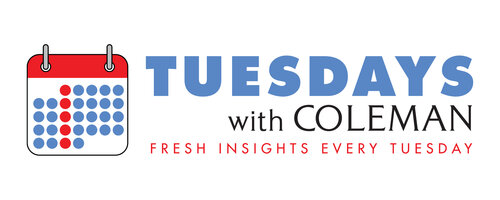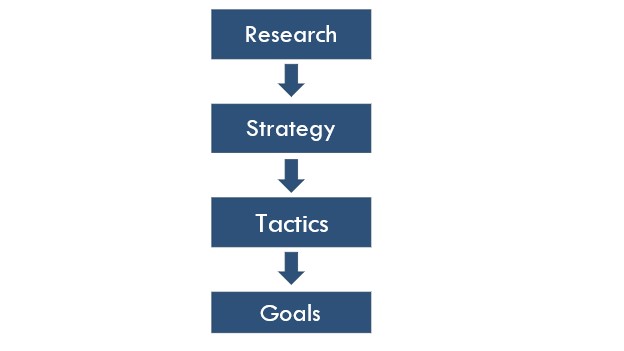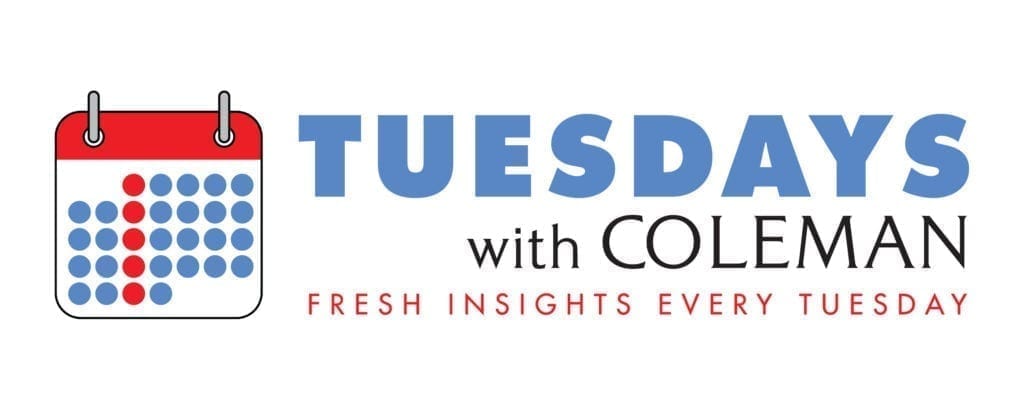
One of the most-read Tuesdays With Coleman blogs (which was published on December 4, 2018) is “Direct Marketing is Easy. Brand Marketing is Hard.” Digital marketers, some of whom may disagree with me on that statement, spend countless hours tracking the success of campaigns and optimizing messages based on the data.
A/B testing is a way of life.
And while the trackability of digital campaigns is great and immensely useful, playing the short-term game and tweaking your SEO (Search Engine Optimization) is only one part of the equation. Most importantly, if you don’t have a clear strategy to inform the tactics, you set yourself up to hit roadblock after roadblock.
Consider how many times this flow has been executed “out of order.”

Here’s an example of how it should play out.
Let’s say the Carolina Panthers want to improve their fan base in the state of North Carolina outside of their home base in Charlotte.
First, they should conduct research to determine where the strongest opportunity is, which informs the strategy. Based on the results, that might turn into “Grow the fanbase in the Raleigh and Greensboro markets.” Or “Grow the fanbase in Asheville.” Or maybe it shows there’s a greater opportunity in another region that the team wasn’t aware of.
Now the strategy can be executed with tactics, which is informed by both elements of the flowchart above it. Research can indicate which markets are most ripe to grow the fan base, and it can also show the best ways to reach them. What shows do they watch? What social media do they use? What radio stations do they listen to?
Only then should a goal be drawn up, because research will have indicated how much opportunity is available in the market. Is the goal to get 1,000 new season ticket holders in Greensboro? 2,500? 5,000? The goal should be ambitious but also based in reality, which research helps provide.
Ever had goals thrown around in your business with no fundamental basis?
Consider how blindfolded you are when starting with each layer other than the top.
- If you set goals without deeply understanding the consumer landscape, how do you know if they are realistic?
- If you focus on tactical without mapping out the strategy, how do you know if the tactics are on target?
- If you focus on strategy without conducting research, how will you know if the strategy is a winning one?
At Coleman Insights, we follow the Research>Strategy>Tactics>Goals flow in our Plan Developer studies.
You likely have beliefs about your market, target audience, strengths, and weaknesses. Perceptual research is designed to test those beliefs. Answer those questions. Identify the strengths and weaknesses. Once we understand the landscape, we map out a strategy to take advantage of what we’ve learned. The tactics, including who to target and where/how to reach them, are informed by the strategy. Finally, specific, actionable, and achievable goals can be set for the team.
Strategy: built on data and opinions, this is how you answer the question: “why are we doing that?”
Tactics: built on strategy, these are individual investments you make to achieve the strategic goal.
Following the process from research to goals is more rewarding, more efficient, and reduces the time and expenditure spent on the wrong direction.

